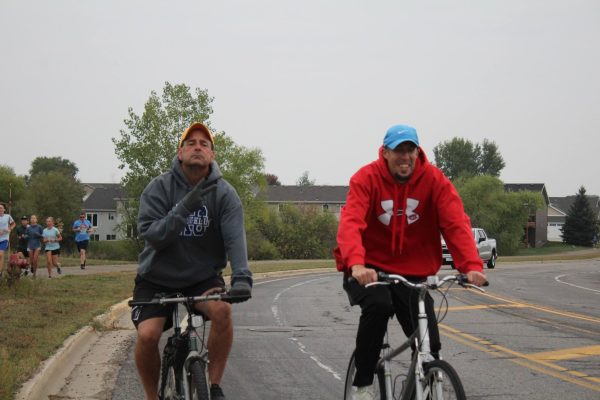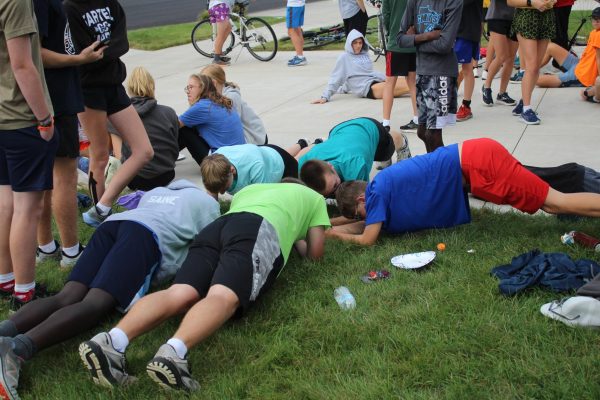The Sartell Cross Country Team creates an atmosphere of encouragement for all members as their fall season progresses, and welcomes anyone who needs support in health and heart.
Founded in the 1970s, the Sartell Cross Country Team is more than just a sport. Coaches, captains, and athletes alike all feel the connections that created the foundation of and continue to fuel the team.
Mr. Driste, who retired last year, has been coaching cross country since he began his teaching career at Sartell in 1988. To him, this sport is unlike any other.
“I think the family aspect of cross country is invaluable,” he stated in an interview. “Kids, boys and girls, grades 6-12 that come together like this, I don’t think you see that in any other program in the entire high school.”

And this familial environment is no accident. In fact, it’s been the ideology of the team since the beginning.
“The cross country philosophy is that you focus on self-improvement,” Mr. Henning, the head coach of the team, remarked. “In order to have that, it has to be [an environment] where everyone feels part of the whole team, rather than just individuals who are self-centered, if you will.”
This philosophy has created a number of traditions and practices that reinforce these ideals among the athletes. One of the most prominent of these is the phrase “Last Sabre In” which applies to the race portion of the sport. Coaches and captains encourage all athletes to gather by the finish line until the last runner crosses. The earlier finishers can bring water to or cheer on the later ones. Small, meaningful acts like these strengthen the bond between members and allow them to forge meaningful connections that last beyond the end of the season.
One of the girls’ team captains, Abby Williamson, certainly feels the effects of these connections. She explained: “I’ve made a lot of new friends through cross country, and it’s just been a nice thing to add to my school experience. The team bonding is really great.”
Being a captain comes with many privileges, as well as many responsibilities. However, Joe Venables, one of the boys’ captains, feels that your position shouldn’t make you feel more or less than other athletes. “[The position of captain] really doesn’t affect my views of the team differently. It should be the same for every kid, I mean, you should still be respected the same whether you’re a captain or not.”

Talking to younger athletes revealed that they do, in fact, feel the same way. Freshman runner Emmy Friese instantly knew the answer when we asked her what she loves most about her sport. “I really like how supportive the team is, and they get your energy going during a race.”
Leadership does not hesitate to assist athletes facing troubles within the sport. Those who have injuries are encouraged to be managers, who record the runner’s times and take photographs at meets and practices. Several runners who have conditions such as asthma are not turned away from the team. The coaches retain that your speed or endurance does not matter in terms of the team. All that matters is your willingness to work hard and do your best.
From the first practice to the last, no matter the pace or position, the Cross Country team will welcome anyone with open arms. The coaches and captains work their hardest to continue previous traditions, as well as create new ones, that work to bring the “family” closer together.
After all, in the words of Mr. Driste: “We’re just trying to keep the train on the tracks and do our best to keep [this program] going.”






